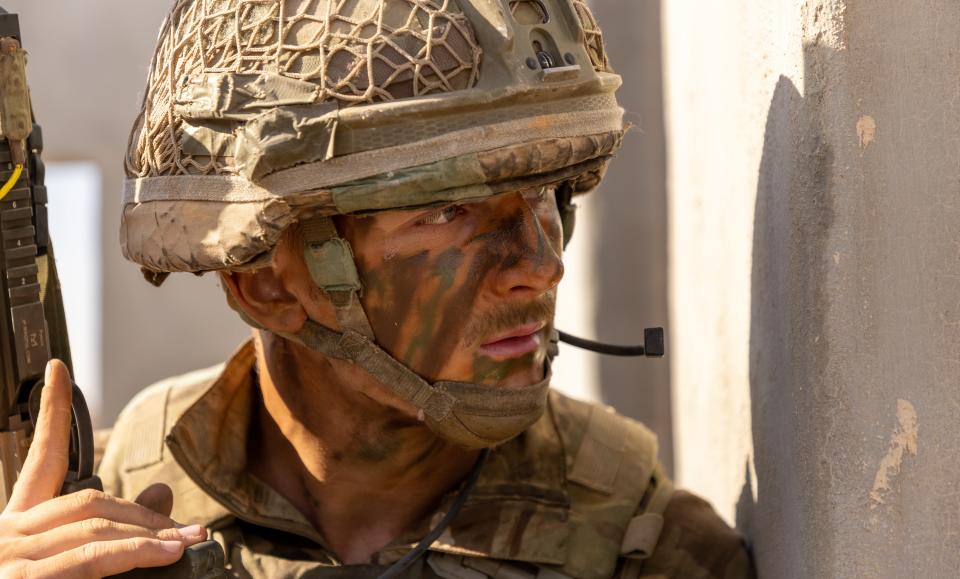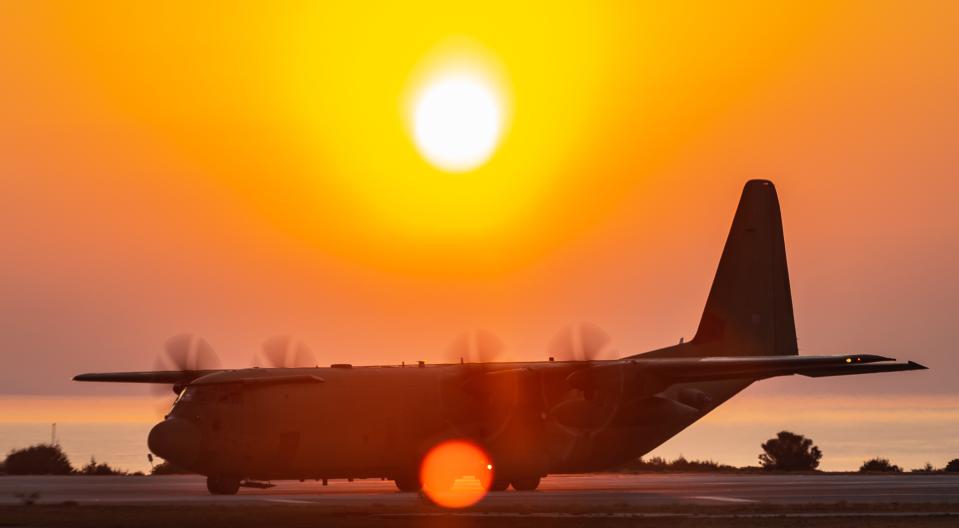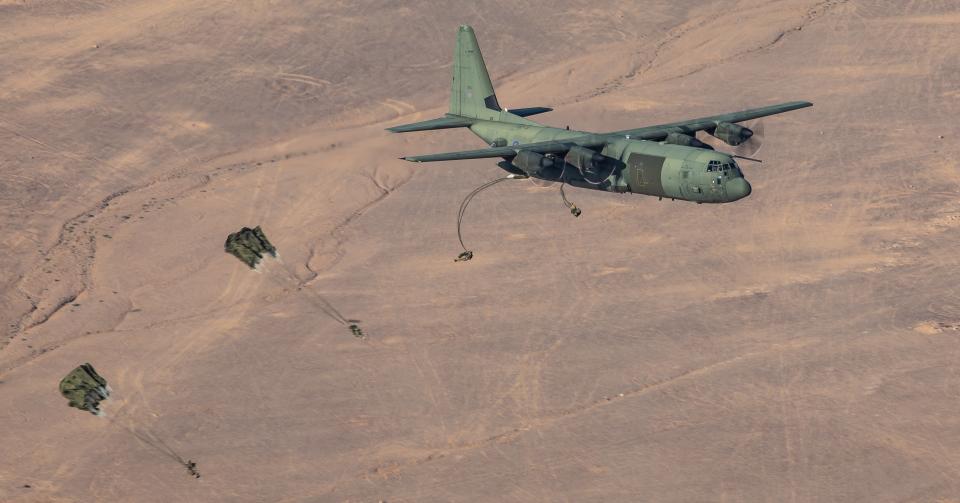‘An era of constant competition’: British troops prepare for next generation of conflict

After parachuting out of a C-130 aircraft at 800 feet, camouflage paint still on his face, Brigadier James Martin reflected on a dangerous world and how Britain is prepared to use force to protect its interests and those of allies.
The commander of the 16 Air Assault Brigade spoke as British troops took part in a combat exercise with the special forces of Jordan. It came in a week in which the aircraft carrier HMS Queen Elizabeth, leading the largest naval and air task force under UK command since the Falklands, started military operations against Isis.
It also came after the Royal Navy took part in a naval exercise in the Black Sea with the US and also Ukraine, whose warships have been in regular confrontation with Russia.
There were claims on Wednesday that a Russian warship had fired warning shots at a British destroyer, HMS Defender. The Russian Interfax news agency reported that the Ministry of Defence in Moscow claimed that the destroyer had ventured up to three miles inside Russian territorial waters near Cape Fiolent, off the coast of Crimea, which was annexed by Russia.
The British Ministry of Defence claimed that no warning shots were fired and the HMS Defender was in international waters. Military sources insisted that the Russian military was carrying out gunnery exercises after giving international shipping adequate warning.
The exercise in Jordan was part of Operation Fortis, which also includes the strikes on Isis from the aircraft carrier. The air assault -- followed by simulated house to house fighting by the British and Jordanians -- took place near Azraq, just over 50 miles from the Syrian border and 12 miles from Zarqa, the hometown of Abu Musab al-Zarqawi, the head of al-Qaeda in Iraq whose group formed what later became Isis.
The Jordanian army’s Quick Response Force (QRF) has its headquarters in Zarqa, which has a history of extremist Islamism. British troops, who partner the Force, may be based in the town in the future, although there are no plans to do so at present.
British and American F-35B Stealth which jets took part in missions against Isis in Syria and Iraq also, it is claimed, “denied airspace” to Russian aircraft flying in an area in support of Bashar al-Assad’s Damascus regime.

Commodore Steve Moorhouse, Commander United Kingdom Carrier Strike Group, had spoken of “rubbing up against Russian activity” in water and airspace : the Eastern Mediterranean had become more “congested and contested” because of the Kremlin’s military presence in Syria, he wanted to point out, stressing, however, that both Western and Russian pilots had a “healthy respect for one another” and avoided aggressive behaviour.
Asked about the threat posed by Isis and whether Russia was a belligerent power, Brigadier Martin repeated the recently often stated warning by British military commanders and ministers of “an era of constant competition”.
He continued : “The clue is in the title, I think there are potential adversaries. I’m not going to give you a list of titles, but I think anyone who wants to destabilise or undermine the rules-based international system is a potential adversary.”
Referring to the strife which has emanated from Syria’s vicious civil war, he continued: “You only need to look north of this border, there are a huge amount of third parties looking for influence, and some of it is done through violent extremist organisations, it’s very much still on the radar.
“There are numerous people looking for advantage, we want to ensure there’s stability and demonstrate to them and our allies that the United Kingdom is committed to stability in the region.”
Part of the post-Brexit ‘Global Britain’ strategy in defence and foreign affairs Boris Johnson’s government has announced, will mean UK forces deployed more abroad, looking outside Nato, with a ‘ Pacific Tilt’ new focus.
Following missions in the Middle East, the Carrier Strike Group will carry out engagements with the navies of India and Japan, who have been in confrontation over land and sea borders respectively with Beijing, as well as the navies of South Korea and Singapore.
All four countries being visited are considered the west’s allies in countering what is seen as China’s expansionist strategy in the Pacific and Indian Oceans.
Under new military doctrine, the 16 Air Assault Brigade is viewed as the cutting edge of rapid response.
Asked whether he expected his troops to be deployed much more abroad, Brigadier Martin commented: “We have had eight years of constant competition. To gain an advantage, to make yourself more competitive, what better way demonstrate your intent at speed and surprise, so that your adversaries and also allies understand how committed you are. I think parachuting as a vote of commitment, and all air manoeuvres, in fact, are actually very viable.”
Some officials have held that the Jordan air drop was the biggest and most significant by British forces in the Middle East since Suez.

There are, however, major differences. The operation in 1956 was part of the invasion of Egypt by British, French and Israeli troops after President Gamal Abdel Nasser nationalised the French and British-owned Suez Canal. And although the mission was successful militarily, and three invading countries had to withdraw after demands to do so from US President Dwight Eisenhower.
The message from British military and diplomats now was one very much of partnership. They also wanted to highlight that the exercise was taking place on the centenary of the state of Jordan.
Many of the British soldiers taking part in the exercise were eager to deploy. Some have not taken part in the long wars of Iraq and Afghanistan.
Captain Dan Lauder had been in the Army for eight and half years, and with 16 Air Assault Brigade for 18 months. “I am of a different generation to those who took part in the really busy days of Iraq and Afghanistan” he said. “One of the most important experiences I have had was helping with Hurricane Irma in the Caribbean ( in 2017). I am proud of what we did there, it was very worthwhile.
“But, of course, there are various different aspects to serving in the military and I’d be very interested in deployment, partnering the forces of another country. It is one of the great opportunities offered in the military to travel and get to know different cultures.”
Corporal Johnny Roberts, 31, from Ipswich, added: “We have trained to take part in deployment which will involve combat. No one wants to see death and destruction, but we’ll do what we have been trained to do.”
The Russian defence attaché, Colonel Denis Khittry, watched the exercise. What was his reaction to what he had witnessed? The Colonel was diplomatic: “It’s the third best thing I have seen in Jordan, after the wonderful ruins at Petra and the tank museum in Amman.”
Read More
US military chief defends study of critical race theory
Last Apple Daily newspaper edition sold out across Hong Kong
Unvaccinated Missourians fuel COVID: 'We will be the canary'

 Yahoo Finance
Yahoo Finance 